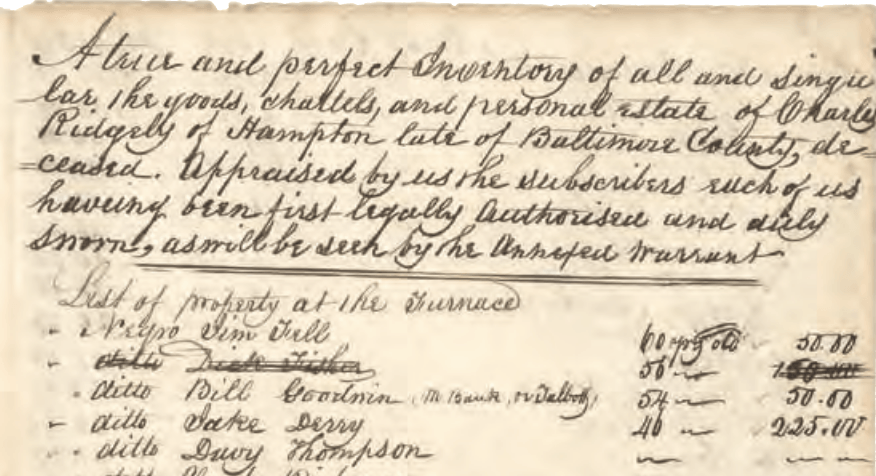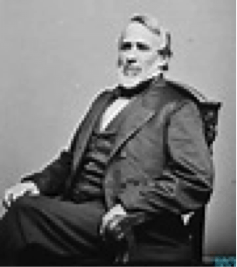Owners of Enslaved Persons on the Eastern Shore Who Served in the Maryland Legislature and the U.S. Congress, Part 1

Excerpt from probate inventory of Governor Charles Carnan Ridgely’s property at Northhampton Furnace, 1829. Image: Maryland State Archives
Slavery in Maryland preceded the colony’s founding in 1634. During most of the 1600s, however, plantation labor was largely performed by indentured servants from England.
Fewer than 1,000 enslaved Africans were brought to Maryland before 1697. Between that date and the outbreak of the American Revolution, nearly 100,000 enslaved men, women, and children, mostly from the Caribbean, had disembarked at the colony’s ports of entry. By 1755, about one-third of the colony’s population was from Africa. On the Eastern Shore, colonial ports of entry were Chestertown, Easton, Cambridge, Salisbury, and Princess Anne.
Those who could afford to be enslavers were primarily owners of substantial plantations, with tobacco as the major money crop during the 1600s and early 1700s. Of course, many middle-class town dwellers purchased enslaved persons as house servants. Around 1750, Eastern Shore agriculture had shifted primarily to the production of wheat, which required less labor. In terms of its impact on enslaved people, one result of this shift was that the Shore counties became a place for breeding enslaved persons for sale to the Deep South.
After American independence and formation of the federal government, among those who held people in slavery during the late 1700s and early 1800s were men who served in the Maryland legislature and/or the U.S. Congress.
This article is the first of three. Here I discuss those from the lower Eastern Shore counties (Worcester, Wicomico, and Somerset). Subsequent articles will focus on those from the Mid-Shore counties (Dorchester and Talbot) and the Upper Shore (Queen Anne’s, Kent, and Cecil). Because it produced no representatives to the state or federal legislature during the period of slavery, Caroline is omitted from this report. The names of these politicians are taken from a Washington Post project to identify enslavers.
Lower Shore Politicians Who Held People in Bondage
Twelve men from the lower Eastern Shore held high political office during the period of slavery. They were:
- Joseph Stewart Cottman (1803-1863), Somerset
- John Woodland Crisfield (1806-1897), Somerset
- George Robertson Dennis (1822-1882), Somerset
- Littleton Purnell Dennis (1786-1834), Worcester
- William Humphries Jackson (1839-1915), Wicomico
- Edward Carroll Long (1808-1865), Somerset
- John Selby Spence (1788-1840), Worcester
- Thomas Ara Spence (1810-1877), Worcester
- James Augustus Stewart (1808-1879), Worcester
- Ephraim King Wilson (1821-1891), Worcester
- George Washington Covington (1808-1911), Worcester
- Isaac Dashiell Jones (1806-1893), Somerset
Here is a more detailed look at the careers of four of these men, with details of their ownership of the enslaved.

Grave of Joseph Stewart Cottman at St. Andrew’s Episcopal
Church in Princess Anne, Md. Photo: findagrave.com
Joseph Stewart Cottman
Joseph Stewart Cottman lived on a plantation named “Motherton” along the south bank of Wicomico Creek in what was then Somerset County (now in Wicomico). Just outside the village of Allen (at that time known as Upper Trappe), the road that approaches it is still known as Cottman Road. Cottman was well-educated, having attended Princeton College in 1821 and Yale College in 1822 and 1823. He was admitted to the Maryland bar in 1826 and began his practice as an attorney in Princess Anne, county seat of Somerset County. He served in the Maryland House of Delegates in 1831-1832 and again in 1839. In 1837, he served in the State Senate. He was elected to the 32nd Congress of the U.S. in 1851 and served until 1853. His campaign for the 33rd Congress was unsuccessful.
In 1840, Cottman held 43 persons in bondage. Ten years later, according to the federal census of 1850, there were 36 enslaved males on his plantation, ranging in age from 1 year to 80. There were 23 females, ranging in age from 1 year to 70. He was by far the largest owner of enslaved persons in his district in that year.

John Woodland Crisfield.
Photo: prabook.com
John Woodland Crisfield
John Woodland Crisfield was born in 1808 near Galena in Kent County and graduated from Washington College. He was admitted to the Maryland bar in 1830. In 1836, he entered the Maryland House of Delegates. Elected as a candidate of the Whig Party, Crisfield served from 1847 until 1849 in the 30th Congress from Maryland’s 6th Congressional district. In 1861, he was elected as a Unionist to the 37th Congress from Maryland’s 1st Congressional district and served one term, which ended in 1863.
Although an owner of enslaved persons, he opposed Maryland’s secession and supported the Union during the Civil War. In March of 1862, President Lincoln spoke with Crisfield about emancipation. Crisfield argued that freedom would be worse for those who were enslaved than slavery itself. In July 1862, Lincoln offered to buy out Maryland slaveholders, offering $300 for each person emancipated. Crisfield refused the offer.
He was defeated in 1863 by John Creswell of Cecil County, who supported the emancipation of the enslaved. Crisfield was a delegate to the National Union Convention in Philadelphia in 1866. He was also instrumental in the construction of the Eastern Shore Railroad and served as president. He died in 1897. The town of Crisfield in Somerset County is named in his honor.

John Selby Spence’s grave in the Episcopal Church
Yard in Worcester Co. Photo: findagrave.com
John Selby Spence
John Selby Spence was born near Snow Hill in Worcester County on February 29, 1788. He received a medical degree from the University of Pennsylvania in 1809 and returned to Worcester County to practice medicine. He was an anti-Jacksonian Whig and served five terms in the House of Representatives from Maryland’s District 1 between 1823 and 1836. He was elected to the U.S. Senate to fill the vacancy resulting from the death of Robert H. Goldsborough. He was re-elected in 1837 and served until his death on October 24, 1840, near Berlin.
According to the Federal Census of 1830 he owned 45 enslaved people. In 1840, the year of his death, that number was reduced to 6.

Ephraim King Wilson, Jr.
Drawing: history.house.gov
Ephraim King Wilson, Jr.
Ephraim King Wilson, Jr., was born in Snow Hill in Worcester County in 1821. He attended Union Academy in Snow Hill and Washington Academy in Princess Anne (in neighboring Somerset County) and graduated from Jefferson College in Cannonsburg, Pa. in 1840. He taught school for six years and was admitted to the bar in 1848, when he established a practice in Snow Hill.
In 1847, King served in the Maryland House of Delegates as a Democrat. He retired from his law practice to his farm in 1867 due to poor health. He served in the U.S. House of Representatives from 1873 to 1875. From 1878 to 1884, he was a judge in the first judicial circuit of Maryland, and was elected in 1884 to the U.S. Senate, in which he served until his death in 1891.
Census records indicate that his father, who lived from 1771 until 1834, owned 12 enslaved persons in 1820 and 11 in 1830. It is likely that Ephraim Wilson, Jr. inherited these or other enslaved people from his father in 1834 and probably added to that group; however, I have not been able to find a record of the number of persons that he held in bondage.
Sources:
More than 1700 congressmen once enslaved Black people. This is who they were, and how they shaped the nation. Julie Zauzmer Weil, Adrian Blanco, and Leo Dominguez. Washington Post, Jan. 10, 2022.
A Guide to the History of Slavery in Maryland, Revised Edition: Annapolis, Md: the Maryland State Archives, 2020.
http://slavery.msa.maryland.gov/pdf/md-slavery-guide-2020.pdf
Wikipedia, Joseph Stewart Cottman
https://en.wikipedia.org/wiki/Joseph_Stewart_Cottman
Shivers, George R., Changing Times: Chronicle of Allen, MD, an Eastern Shore Village. Baltimore: Gateway Press, 1998
Find a Grave, Joseph Stewart Cottman
https://www.findagrave.com/memorial/7856021/joseph-stewart-cottman
Prabook, John Woodland Crisfield.
https://prabook.com/web/john.woodland_crisfield/2239928
Find a Grave, John Selby Spence
https://www.findagrave.com/memorial/26182448/john-selby-spence
History, Art, and Archives. U.S. House of Representatives, Ephraim King Wilson.
https://history.house.gov/People/Listing/W/WILSON,-Ephraim-King-(W000577)/
Wikipedia, Ephraim King Wilson.
https://en.wikipedia.org/wiki/Ephraim_King_Wilson
A native of Wicomico County, George Shivers holds a doctorate from the University of Maryland and taught in the Foreign Language Dept. of Washington College for 38 years before retiring in 2007. He is also very interested in the history and culture of the Eastern Shore, African American history in particular.
Common Sense for the Eastern Shore







